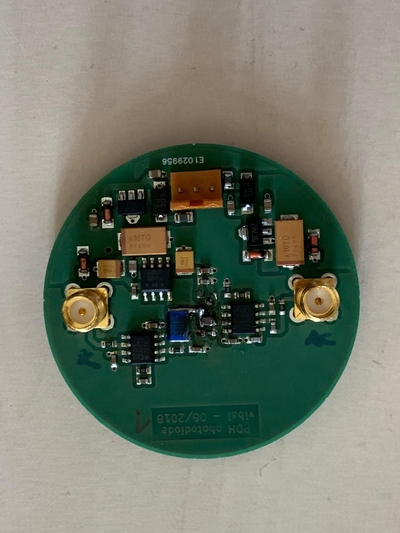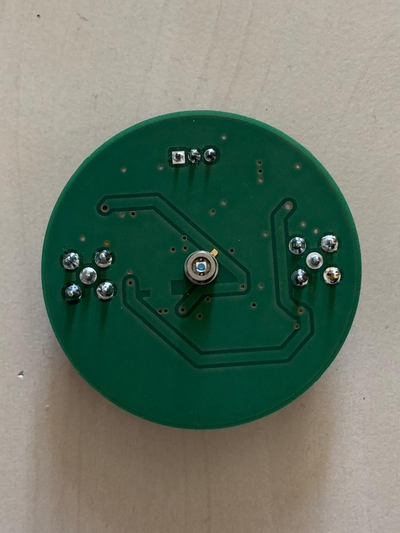meta data for this page
Translations of this page:
- en
This is an old revision of the document!
Photodiode Étienne
These photodiodes were developed by Étienne in cooperation with the AEI and altered to peak at about 16.2MHz.
Schematics Used
Notable Changes Made
To achieve a peak at around 16.2MHz, components had to be changed.
Changed components:
| Schematic Component | Used Component | |
|---|---|---|
| L1 | 6u8 | 6u8 |
| C3 | 6p | 2 x 4.7p |
| R2 | 40.2R | 40.2R |
| Changed only for the 3rd and 4th build | ||
| U5 | AD587 | LT1236A-10 |
| C19 | 1u | none |
- For Coil L1 the part 1812CS-682XJLC (or at least a part with the same form factor) has to be used
- C3 influences at which frequency the peak will be
- Instead of the AD587, LT1236A-10 can be used
- When doing this, the C19 component must not be soldered.
- C19 connects pin 8 of U5 to ground. Pin 8 is not in use in LT1236A-10.
Using The Photodiode
- The photodiode requires a power input of +/- 15V
- AC Output: right SMA connector
- DC Output: left SMA connector
- When using a spectrum-analyzer (e.g. RIGOL DSA815) in combination with the ROHDE&SCHWARZ signal-generator, a 50Ω terminator must be used, too
Measured Data
The traces of the amplitude and phase were measured.


![FWHM [Diode 1]: 271750.86662876786Hz FWHM [Diode 1]: 271750.86662876786Hz](/lib/exe/fetch.php?media=groups:mg:private:resonatoren:photodiodeetienne:fit1.png)
![FWHM [Diode 2]: 270984.2391765082Hz FWHM [Diode 2]: 270984.2391765082Hz](/lib/exe/fetch.php?media=groups:mg:private:resonatoren:photodiodeetienne:fit2.png)
![FWHM [Diode 3]: 271450.8282159102Hz FWHM [Diode 3]: 271450.8282159102Hz](/lib/exe/fetch.php?media=groups:mg:private:resonatoren:photodiodeetienne:fit3.png)
![FWHM [Diode 4]: 269724.22527546244Hz FWHM [Diode 4]: 269724.22527546244Hz](/lib/exe/fetch.php?media=groups:mg:private:resonatoren:photodiodeetienne:fit4.png)